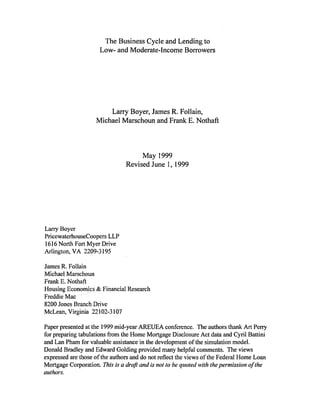The Business Cycle and Lending to Low- and Moderate-Income Borrowers
It is well documented that recessions disproportionately affect less-skilled members of the labor force and, by sector, affect the housing industry the most. Mortgage lending volumes are also affected, as property sales move directly with economic activity while refinance volume varies with interest rates. Our analysis focuses on how lending to low- and moderate-income families varies with economic conditions. In so doing, we use national time series data to examine variation in the multifamily share of residential lending and single-family loan data collected under the Home Mortgage Disclosure Act over 1990 to 1997 to examine how shares of lending to lower -income borrowers vary with economic conditions. We supplement these analyses with a projection of single-family and multifamily lending under a variety of economic scenarios. We find that the low- and moderate-income share of lending is highly volatile over time and that macroeconomic conditions explain a significant part of this variation. The analysis reveals that a two percentage point change in mortgage interest rates can cause the low- and moderate-income share of lending to fluctuate by as much as eight percent. Presented at 1999 mid-year AREUEA conference. Authors: Larry Boyer, James R. Follain, Michael Marschoun and Frank E. Nothaft






















